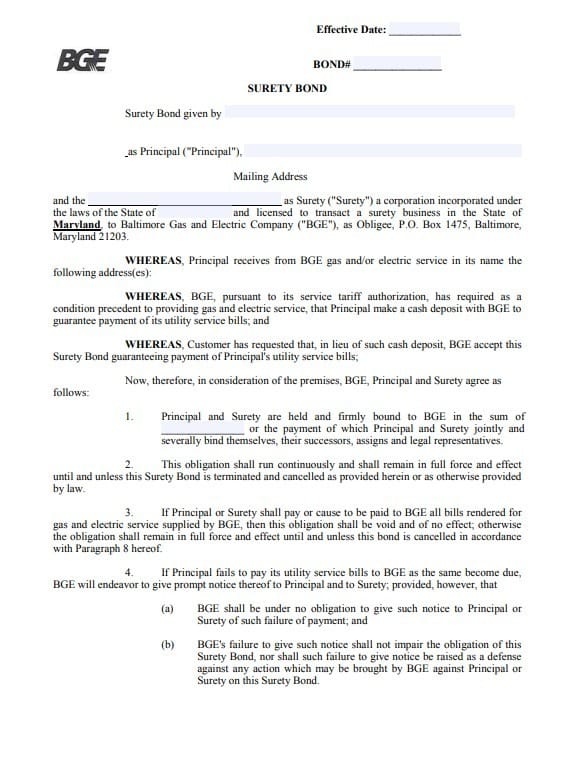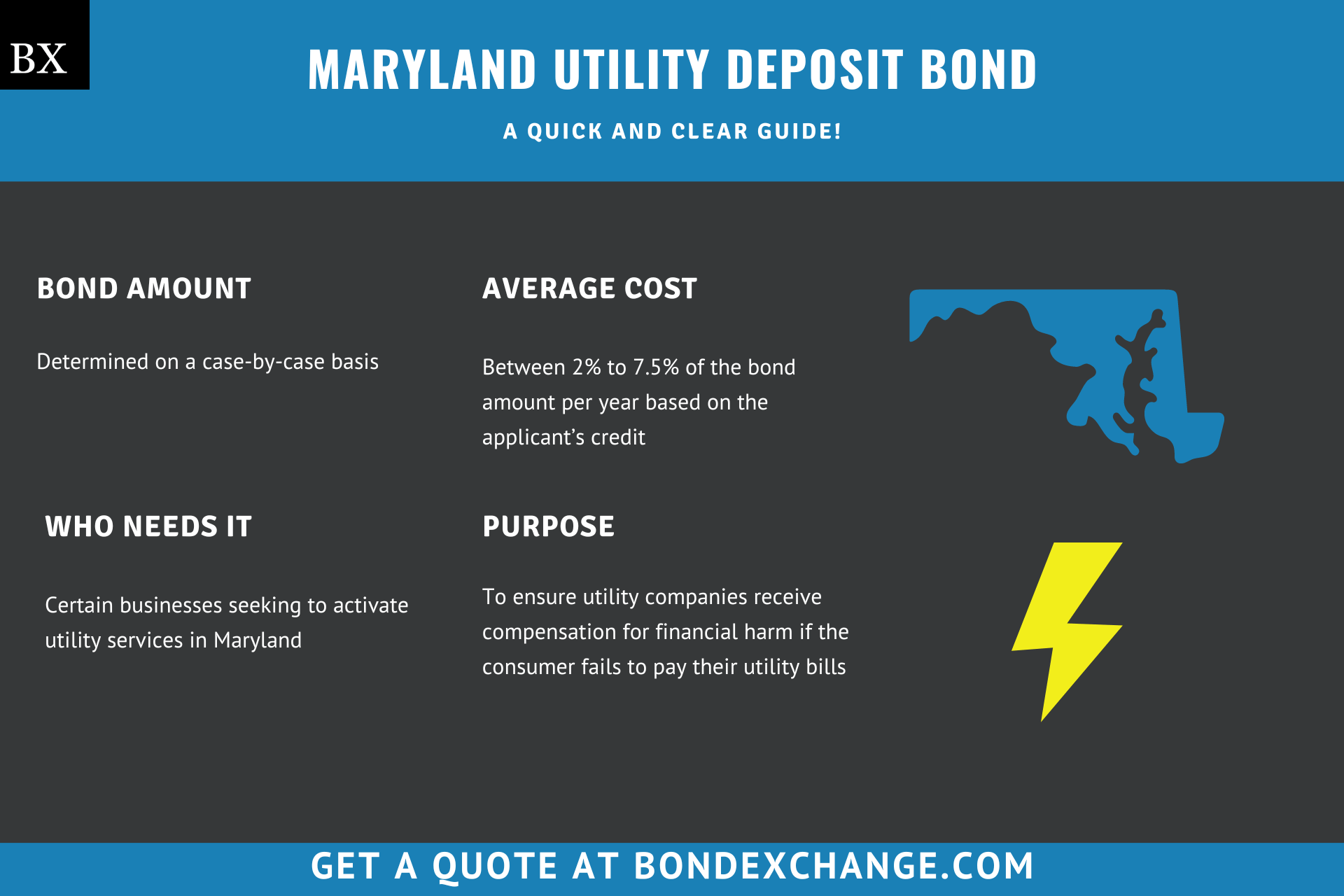Maryland Utility Deposit Bond: A Comprehensive Guide
This guide provides information for insurance agents to help their customers obtain a Massachusetts Utility Deposit bond.
At a Glance:
- Average Cost: Between 2% to 7.5% of the bond amount per year based on the applicant’s credit
- Bond Amount: Determined on a case-by-case basis (more on this later)
- Who Needs it: Commercial customers that do not want to pay a cash deposit
- Purpose: To ensure the utility company receives compensation for financial harm if the business fails to pay their utility bills
- Who Requires Utility Deposit Bonds in Maryland: The Baltimore Gas and Electric Company

Background
The Maryland Public Service Commission allows utility companies to require customers to pay a security deposit before initiating service. Security deposits help ensure utility companies do not suffer financial harm if customers do not pay their bills. In lieu of depositing cash, the Baltimore Gas and Electric Company allows commercial customers to purchase and maintain a surety bond.
What is the Purpose of the Maryland Utility Deposit Bond?
The Baltimore Gas and Electric Company requires commercial customers not wishing to deposit cash to purchase a surety bond as a prerequisite to obtaining utility services. The bond ensures that the company will receive compensation for financial harm if the customer fails to comply with the provisions laid out in the bond form. Specifically, the bond protects the utility company if the customer does not pay their monthly bills. In short, the bond is a type of insurance that protects utility companies if the customer fails to remit all required payments.
How Can an Insurance Agent Obtain a Maryland Utility Deposit Surety Bond?
BondExchange makes obtaining a Maryland Utility Deposit bond easy. Simply login to your account and use our keyword search to find the “utility” bond in our database. Don’t have a login? Gain access now and let us help you satisfy your customers’ needs. Our friendly underwriting staff is available by phone (800) 438-1162, email or chat from 7:30 AM to 7:00 PM EST to assist you.
At BondExchange, our 40 years of experience, leading technology, and access to markets ensures that we have the knowledge and resources to provide your clients with fast and friendly service whether obtaining quotes or issuing bonds.
Not an agent? Then let us pair you with one!

Click the above image to find a BX Agent near you
How is the Bond Amount Determined?
The Baltimore Gas and Electric company states that the bond amount must equal the maximum estimated usage for two consecutive billing periods or 90 days.
Is a Credit Check Required for the Maryland Utility Deposit Bond?
Surety companies will run a credit check on the applicant to determine eligibility and pricing for the Maryland Utility Deposit bond. Applicants with excellent credit and work experience can expect to receive the best rates. Applicants with poor credit may be declined by some surety companies or pay higher rates. The credit check is a “soft hit”, meaning that the credit check will not affect the applicant’s credit.
How Much Does the Maryland Utility Deposit Bond Cost?
The Maryland Utility Deposit bond can cost anywhere between 2% to 7.5% of the bond amount per year. Insurance companies determine the rate based on a number of factors, including your customer’s credit score and experience. The chart below offers a quick reference for the approximate bond cost on a $10,000 bond requirement.
$10,000 Utility Deposit Bond Cost
| Credit Score* | Bond Cost (1 year) | Bond Cost (1 month) |
|---|---|---|
| 800+ | $200 | $20 |
| 650 – 799 | $500 | $50 |
| 600 – 649 | $750 | $75 |
*The credit score ranges do not include other factors that may result in a change to the annual premium offered to your customers, including but not limited to, years of experience and underlying credit factors contained within the business owner’s credit report.
BondExchange now offers monthly pay-as-you-go subscriptions for surety bonds. Your customers are able to purchase their bonds on a monthly basis and cancel them anytime. Learn more here.
Who May Purchase a Maryland Utility Deposit Bond?
Commercial customers of the Baltimore Gas and Electric Company that do not wish to pay a cash deposit may purchase a surety bond to initiate service.
How do Baltimore Gas and Electric Company Commercial Customers Obtain Utility Services?
Baltimore Gas and Electric Company commercial customers must navigate several steps to obtain utility services. Below are the general guidelines, but applicants should refer to the company’s consumer reference guide for details on the process.
Step 1 – Complete the Application
Businesses can complete an online application to request service.
Step 2 – Purchase a Surety Bond or Deposit Cash
After completing the application, the company will inform the customer of their required bond/deposit amount (limit calculation outlined above). Customers that wish to purchase a surety bond must contact the Baltimore Gas and Electric Company before doing so.
How Do Maryland Utility Customers File Their Bonds?
Utility customers in Maryland should submit their completed bond forms, including the power of attorney, to the Baltimore Gas and Electric Company at the following address:
110 W Fayette St
Baltimore, MD 21201
The surety bond requires signatures from the surety company that issues the bond, the customer, and witness signatures for both parties. The surety company will include the following information on the bond form:
- Name and address of the entity/individual(s) buying the bond
- Surety company’s name and state of incorporation
- Bond amount
- Date the bond is signed
What Can Utility Customers in Maryland Do to Avoid Claims Against Their Bonds?
To avoid claims on their bonds, utility customers in Maryland must ensure they pay their utility bills on time and in full.
What Other Insurance Products Can Agents Offer Utility Customers in Maryland?
Maryland only requires businesses to be bonded. As such, agents can offer their customers general business and liability insurance in addition to the utility deposit bond. Bonds are our only business at BondExchange, so we do not issue liability insurance, but our agents often utilize brokers for this specific line of business. A list of brokers in this space can be found here.
Should Your Customer Purchase a Surety Bond or Deposit Cash?
Surety bonds are generally considered the better option for businesses, as they free up working capital that would otherwise have to be deposited with the utility company. For more information on whether your customer should purchase a bond or deposit cash, check out our Surety Bonds vs. Letters of Credit article here.

